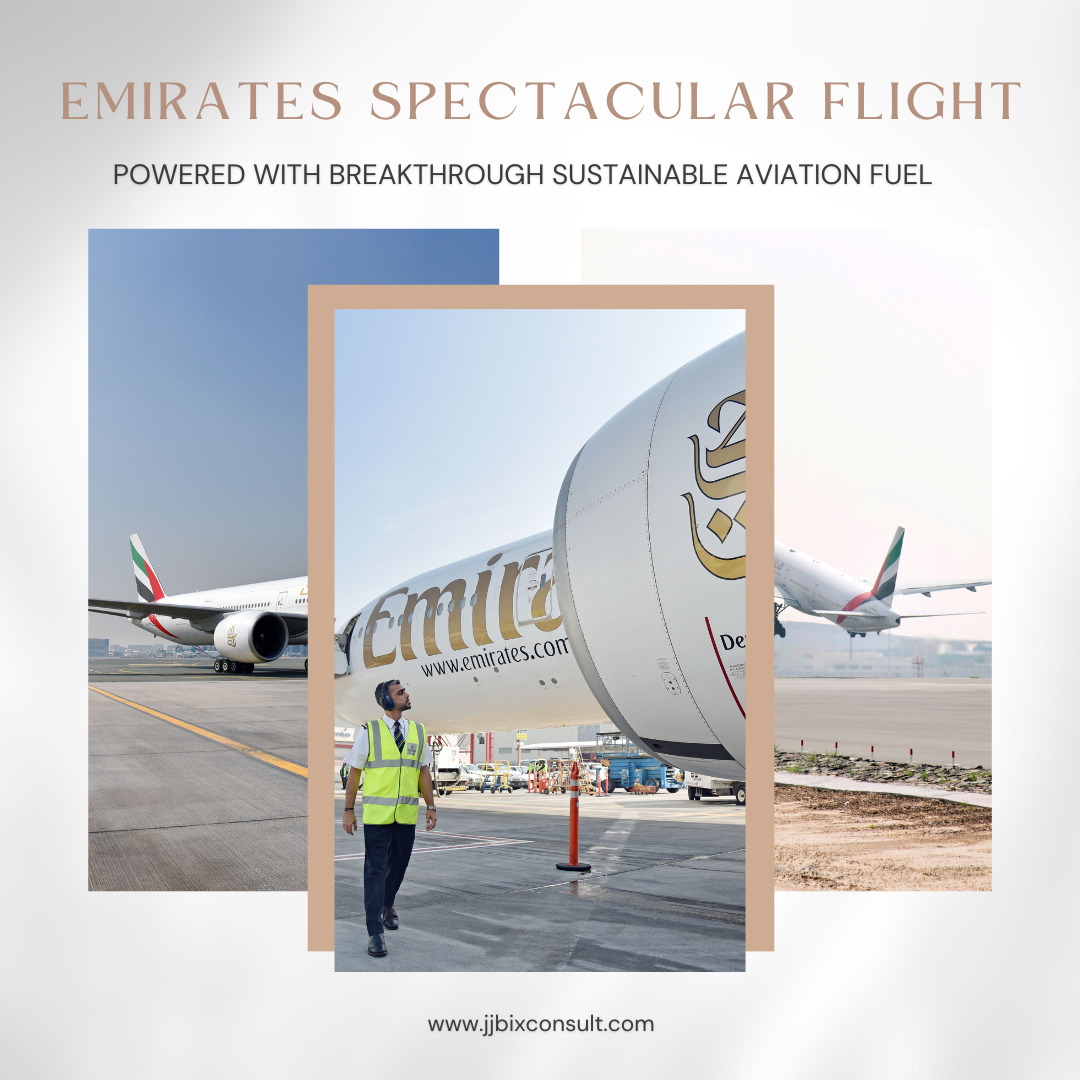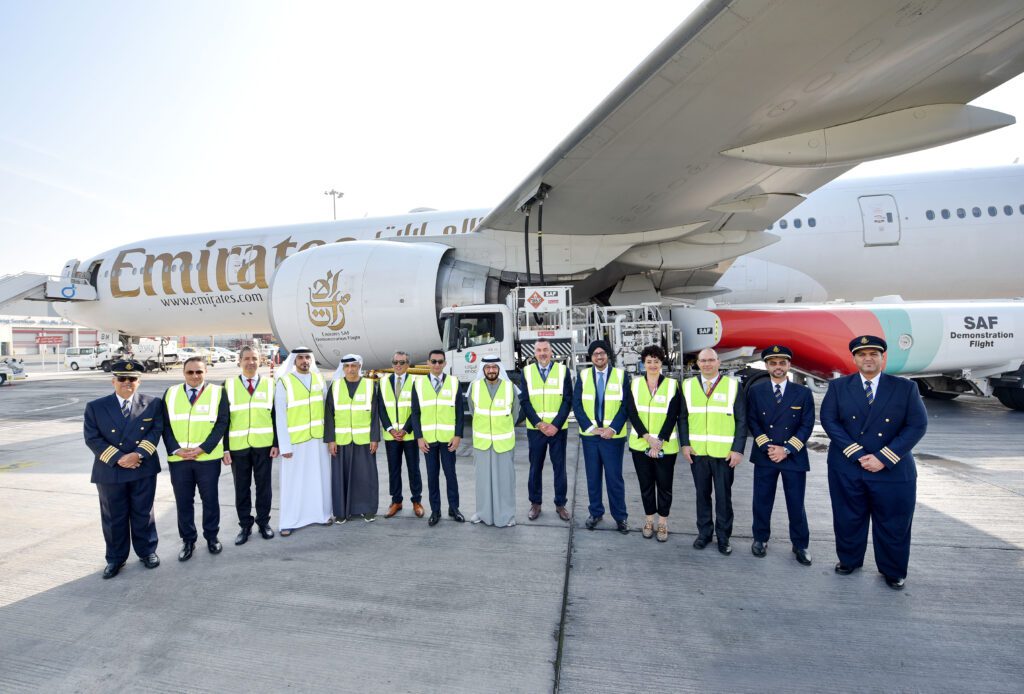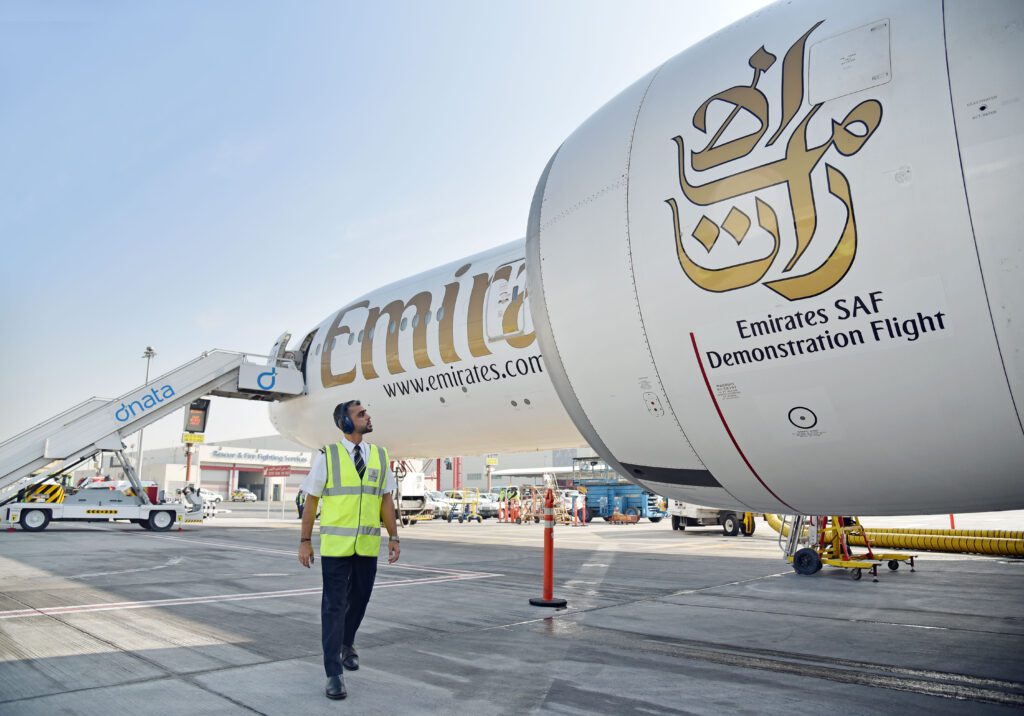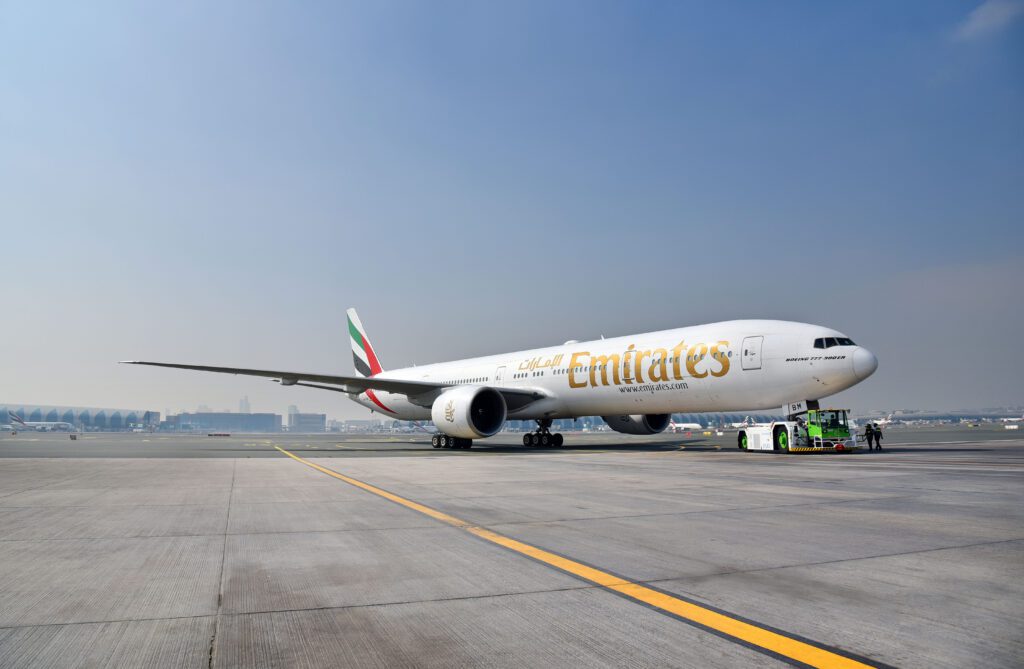
Emirates Spectacular Flight powered by sustainable aviation fuel
Emirates Spectacular Flight Powered With Breakthrough Sustainable Aviation Fuel. Conducted in partnership with GE Aerospace, Boeing, Honeywell, Neste and Virent
First demonstration flight in Middle East and North Africa to be powered by 100% SAF in one of two engines

Emirates Flight Powered With Breakthrough Sustainable Aviation Fuel
Emirates has operated its first milestone demonstration flight on a Boeing 777-300ER, powering one of its engines with 100% Sustainable Aviation Fuel (SAF). The flight took off from Dubai International Airport (DXB), and was commanded by Captain Fali Vajifdar and Captain Khalid Nasser Akram, flying for more than one hour over the Dubai coastline. The flight deck crew were accompanied by Adel Al Redha, Emirates’ Chief Operating Officer, and Captain Hassan Hammadi, Divisional Senior Vice President, Emirates Flight Operations.
The demonstration flight powered by SAF holds particular significance as the UAE declares 2023 the ‘Year of Sustainability’. The year will showcase the UAE’s commitment to seek innovative solutions to challenges such as energy, climate change and other issues related to sustainability. The flight supports collective industry efforts to enable a future of 100% SAF flying and help advance the UAE’s sustainability objectives.
Emirates’ demonstration flight, the first in the Middle East and North Africa to be powered by 100% SAF, supports broader efforts to reduce lifecycle CO2 emissions as the industry looks to scale up its use of SAF. The flights will also help to refine the playbook for future SAF demonstrations, and support future certification where 100% drop-in SAF fuel is approved for aircraft. Currently, SAF is approved for use in all aircraft, but only in blends of up to 50% with conventional jet fuel.
Emirates worked alongside partners GE Aerospace, Boeing, Honeywell, Neste and Virent to procure and develop a blend of SAF that closely replicates the properties of conventional jet fuel. At each blend ratio, a host of chemical and physical fuel property measurements were carried out. After multiple lab tests and rigorous trials, they arrived at a blending ratio that mirrored the qualities of jet fuel. Eighteen tonnes of SAF were blended, comprised of HEFA-SPK provided by Neste (hydro processed esters and fatty acids and synthetic paraffinic kerosene) and HDO-SAK from Virent (hydro deoxygenated synthetic aromatic kerosene). The 100% SAF supplied one GE90 engine, with conventional jet fuel supplying the other engine.
The test flight further demonstrates the compatibility of the specially blended SAF as a safe and reliable fuel source. The promising outcome of this initiative also adds to the body of industry data and research around SAF blends in higher proportions, paving the way for standardization and future approval of 100% drop-in SAF as a replacement for jet fuel, well above the current 50% blend limit.
GE, Boeing, Honeywell Aerospace on the flight

“GE Aerospace congratulates Emirates on this major achievement. SAF is critical to helping the aviation industry reach its goal to be net zero by 2050 and collaborations like this to test 100% SAF globally will help bring us closer to this target,” said Aziz Koleilat, Vice President of Global Sales and Marketing for the Middle East, Eastern Europe, and Turkey at GE Aerospace. “All GE Aerospace engines can operate on approved SAF blends today and we are helping support the approval and adoption of 100% SAF.”
“Boeing congratulates Emirates on its successful flight tests using sustainable aviation fuel (SAF),” said Omar Arekat, Vice President, Commercial Sales and Marketing, Middle East, The Boeing Company. “SAF will play a critical role in the aviation industry’s commitment to be net zero by 2050, requiring strong industry collaboration. We were proud to partner with Emirates on these tests and look forward to further working with our partners to enable the widespread use of SAF across the globe.”
“We are excited to apply our technology to such a milestone demonstration. The 331-500 auxiliary power unit or APU is an integral part of the Boeing 777 aircraft system. The APU provides main engine starting, environmental control and emergency back-up systems for the aircraft on the ground and in-flight. It uses the same fuel as the main propulsion engines. Currently the APU is certified to run on only 50% SAF, so this demonstration is a big first step in showing full APU functionality and capability when running on 100% SAF,” said Mosab Alkubaisy, Director of Airlines, Honeywell Aerospace Middle East.
Neste Renewable Aviation on the Flight

Jonathan Wood, Vice President EMEA, Renewable Aviation at Neste said: “Sustainable aviation fuel plays a crucial role in reducing the emissions of air travel but to fully leverage its decarbonization potential we need to enable 100% SAF use. Test flights like this Emirates flight with Neste MY Sustainable Aviation Fuel are an important step towards 100% SAF certification. Neste is working closely together with partners to accelerate the availability and use of SAF as we increase our SAF production capacity to 1.5 million tons per annum by the end of this year. We look forward to growing the supply of SAF also to Dubai.”
“Virent’s technology converts widely available, plant-based sugars into the compounds that make 100% sustainable aviation fuel possible, without the need to blend with traditional jet fuel,” said Dave Kettner, President and General Counsel of Virent, Inc. “Along with our parent company Marathon Petroleum Corporation, we are committed to meeting today’s energy needs while investing in an energy diverse future, and today’s flight is a great example of this commitment. We’re excited about this opportunity to work with our forward-thinking colleagues at Emirates, GE Aerospace, Boeing, Honeywell and Neste as we demonstrate that we can power sustainable aviation without modifying today’s modern airline engines or the infrastructure that serves the airline industry.”
Source: Media Centre, Emirates
Read More Trending news on this site: BAE Systems New Orders for High Tech Eurofighter Typhoon




